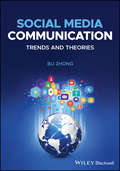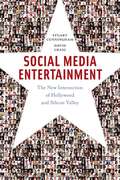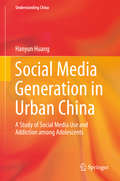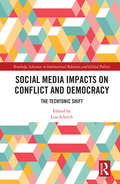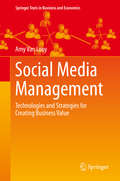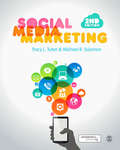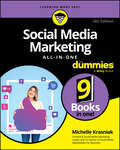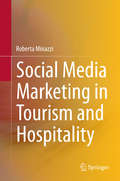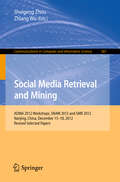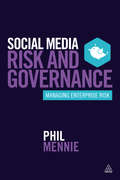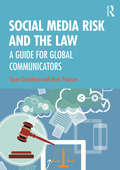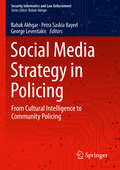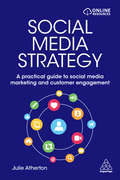- Table View
- List View
Social Media Communication: Trends and Theories
by Bu ZhongExamines the social media mechanism and how it is transforming communication in an increasingly networked society Social Media Communication: Trends and Theories explores how social media is transforming the way people think and behave. Providing students with an in-depth understanding of the mechanism underlying social media, this comprehensive textbook uses a multidisciplinary approach to examine social media use in a wide range of communication and business contexts. Each chapter is based on original research findings from the author as well as recent work in communication studies, neuroscience, information science, and psychology. Divided into two parts, the text first describes the theoretical foundation of social media use, discussing the impact of social media on information processing, social networking, cognition, interpersonal and group communication, the media industry, and business marketing. The second half of the book focuses on research-based strategies for effectively using social media in communication and business such as the news industry, heath care, and social movements. Offering detailed yet accessible coverage of how digital media technology is changing human communication, this textbook: Helps readers make the best use of social media tools in communication and business practices Introduces more than a dozen theories in the areas of communication, psychology, and sociology to highlight the theoretical frameworks researchers use in social media studies Identifies a variety of trends involving social media usage, including the app economy and patient care Addresses the relation between social media and important contemporary topics such as cultural diversity, privacy, and social change Presents 14 imperative social media topics, each with the power to change the ways you see and use social media Social Media Communication: Trends and Theories is the perfect textbook for undergraduate and graduate courses in communication, business, journalism, business, and information science and technology. It is also an invaluable resource for researchers, educators, journalists, entrepreneurs, and professionals working in media management, advertising, public relations, and business marketing.
Social Media Entertainment: The New Intersection of Hollywood and Silicon Valley (Postmillennial Pop #7)
by Stuart Cunningham David CraigWinner, 2020 Outstanding Book Award, given by the International Communication AssociationHonorable Mention, 2020 Nancy Baym Book Award, given by the Association of Internet ResearchersHow the transformation of social media platforms and user-experience have redefined the entertainment industryIn a little over a decade, competing social media platforms, including YouTube, Facebook, Twitter, Instagram, and Snapchat, have given rise to a new creative industry: social media entertainment. Operating at the intersection of the entertainment and interactivity, communication and content industries, social media entertainment creators have harnessed these platforms to generate new kinds of content separate from the century-long model of intellectual property control in the traditional entertainment industry. Social media entertainment has expanded rapidly and the traditional entertainment industry has been forced to cede significant power and influence to content creators, their fans, and subscribers. Digital platforms have created a natural market for embedded advertising, changing the worlds of marketing and communication in their wake. Combined, these factors have produced new, radically shifting demands on the entertainment industry, posing new challenges for screen regimes, media scholars, industry professionals, content creators, and audiences alike.Stuart Cunningham and David Craig chronicle the rise of social media entertainment and its impact on media consumption and production. A massive, industry-defining study with insight from over 100 industry insiders, Social Media Entertainment explores the latest transformations in the entertainment industry in this time of digital disruption.
Social Media Generation in Urban China
by Hanyun HuangSocial media such as instant messaging (IM), social networking sites (SNS), blogs and microblogs are an integral part of adolescents' lives in China. Anecdotal evidence reported in the news has suggested that the increasing popularity of social media could make adolescents more vulnerable to being addicted. This exploratory study proposes the concept of "social media addiction" and examines (a) whether social media addiction exists among adolescents in urban China and, if so, who the addicts are, what their symptoms are and to what extent they are addicted; (b) whether sociopsychological traits (e. g. , need for affiliation, impression management, narcissism and leisure boredom) can predict social media addiction among adolescents; (c) what gratifications are obtained by adolescents from their use of social media and whether these gratifications can predict social media addiction and (d) to what degree social media addiction influences adolescents' academic performance and social capital. This study employed quantitative questionnaire surveys among adolescents as the main research method, supplemented by qualitative pre-survey focus groups among adolescents and post-survey in-depth interviews among parents and teachers. Questionnaire surveys were conducted based on a multi-stage cluster sampling of seven middle schools in five urban Chinese cities: Beijing, Shanghai, Guangzhou, Shenzhen and Xiamen. The final sample consisted of 1,549 adolescents, of whom 90% had used social media. Using Young's classic definition of Internet addiction, 15. 6% of participants were classified as social media addicts. The addicted adolescents were often self-absorbed, bored with their leisure time, and good at using manipulation through social media for impression management. Addicts experienced four major social media addiction symptoms: preoccupation, adverse consequences, alleviation of negative emotions and loss of interest in social activities. The seven social media gratifications identified in this study can be categorized into social, information and entertainment gratifications. Among these, entertainment gratifications had the most power to predict social media addiction, while information gratifications were the least likely to lead to addiction. Furthermore, these gratifications were found to be powerful mediators between the adolescents' sociopsychological traits and social media addiction. Finally, the results also indicated that social media addiction and its symptoms had a significant negative impact on adolescents' academic performance and social capital.
Social Media Impacts on Conflict and Democracy: The Techtonic Shift (Routledge Advances in International Relations and Global Politics)
by Lisa SchirchSocial media technology is having a dramatic impact on social and political dynamics around the world. The contributors to this book document and illustrate this "techtonic" shift on violent conflict and democratic processes. They present vivid examples and case studies from countries in Africa, South and Southeast Asia, Latin America as well as Northern Ireland. Each author maps an array of peacebuilding solutions to social media threats, including coordinated action by civil society, governments and tech companies to protect human minds, relationships and institutions. Solutions presented include inoculating society with a new digital literacy agenda, designing technology for positive social impacts, and regulating technology to prohibit the worst behaviours. A must-read both for political scientists and policymakers trying to understand the impact of social media, and media studies scholars looking for a global perspective.
Social Media Intelligence
by Wendy W. Moe David A. SchweidelIn the world of Facebook, Twitter and Yelp, water-cooler conversations with co-workers and backyard small talk with neighbors have moved from the physical world to the digital arena. In this new landscape, organizations ranging from Fortune 500 companies to government agencies to political campaigns continuously monitor online opinions in an effort to guide their actions. Are consumers satisfied with our product? How are our policies perceived? Do voters agree with our platform? Measuring online opinion is more complex than just reading a few posted reviews. Social media is replete with noise and chatter that can contaminate monitoring efforts. By knowing what shapes online opinions, organizations can better uncover the valuable insights hidden in the social media chatter and better inform strategy. This book can help anyone facing the challenge of making sense of social media data to move beyond the current practice of social media monitoring to more comprehensive use of social media intelligence.
Social Media Management
by Amy Van LooyThis undergraduate textbook adopts the perspective of organizations - not individuals - and clarifies the impact of social media on their different departments or disciplines, while also exploring how organizations use social media to create business value. To do so, the book pursues a uniquely multi-disciplinary approach, embracing IT, marketing, HR and many other fields. Readers will benefit from a comprehensive selection of current topics, including: tools, tactics and strategies for social media, internal and external communication, viral marketing campaigns, social CRM, employer branding, e-recruiting, search engine optimization, social mining, sentiment analysis, crowdfunding, and legal and ethical issues.
Social Media Marketing
by Dr Tracy L. Tuten Professor Michael R. SolomonSocial Media Marketing was the first textbook to cover this vital subject. It shows how social media fits into and complements the marketer's toolbox. The book melds essential theory with practical application as it covers core skills such as strategic planning for social media applications, incorporating these platforms into the brand's marketing communications executions, and harnessing social media data to yield customer insights. The authors outline the 'Four Zones' of social media that marketers can use to achieve their strategic objectives. These include: 1. Community (e.g. Instagram) 2. Publishing (e.g. Tumblr) 3. Entertainment (e.g. Candy Crush Saga) 4. Commerce (e.g. Groupon) This second edition contains new examples, industry developments and academic research to help students remain current in their marketing studies, as well as a new and improved user-friendly layout to make the text easy to navigate. The textbook also provides a free companion website that offers valuable additional resources for both instructors and students. Visit: study.sagepub.com/smm. Readers of the book are also invited to join the authors and others online by using the hashtag: #smm
Social Media Marketing
by Githa Heggde G. ShaineshThis book focuses on the role of social media as the next major game-changer. Social media has emerged as the defining trend in the last decade and continues to restructure communication and interactions between individuals, communities, governments and businesses. Researchers and marketers are still struggling with the profound impact of rapidly evolving social media on viral user-generated content, its ability to shape consumer perceptions, and the constantly changing landscape for developing business cases to proactively engage with stakeholders. The growing opportunities to “hear” about customer priorities and concerns on company managed channels as well as third-party review sites, including social media pages, across the digital space are accompanied by the challenges of responding to these conversations in real-time, which calls for a massive shift in the way marketing functions engage in dialogue with customers. As leading users of social media in emerging markets, Indians are increasingly logging into their Facebook and Twitter accounts, with the country recording the highest growth in social networking. This book begins by discussing the impact of social media on marketing, from brand building, communications, and advertising to customization and customer engagement. The book approaches the subject matter systematically, identifying broad trends, concepts and frameworks in the first few chapters. It then goes on to address the varied application of social media in marketing for different sectors. Primarily focusing on understanding digital consumers, the book integrates social media with marketing and the outcome. It also presents new, selected cases of successful digital companies in emerging markets never before considered. Researchers and managers alike will find this book to be a handy reference guide to social media in emerging markets.
Social Media Marketing All-in-One For Dummies
by Michelle KrasniakShare your brand message and connect with your customers There's no way around it—social media is everywhere, and the savviest businesses are making the most of it. With the help of Social Media Marketing All-in-One For Dummies, you, too, can join the digital era and take your social media accounts to the next level. Accessible and comprehensive, this guide teaches you to apply your marketing skills to the latest social media platforms, allowing you to promote your business, reach customers, and thrive in the global marketplace. Get up to date with information on AI tools and AI-generated content, as well as voice search, short-form video content, and more. Let this Dummies book coach you to social media marketing success. Get acquainted with the top social media platforms for business marketing Learn how to create more compelling content—with or without the help of AI Consider social commerce and influencer partnerships in your marketing mix Use groups, communities, and private spaces to build trust and camaraderie This nine-in-one guide is perfect for social media strategists, web site managers, marketers, publicists, and anyone else in charge of an organization's social media strategy. It's also a great choice for entrepreneurs interested in learning how social media can help generate business.
Social Media Marketing In A Week: Create Your Successful Social Media Strategy In Just Seven Days
by Nick SmithSocial Media Marketing In A Week is a simple and straightforward guide to mastering the basics, giving you everything you need to know in just seven short chapters. From making the right first impression and having a unified message and strategy, to knowing where your audience is, engaging them and managing your reputation, you'll discover how to build a relationship with your customers on sites like Facebook, YouTube, Flickr and Pinterest, without selling to them. This book shows you how to get started with social media giving you the ability and best practice to interact confidently with your fans and subscribers. Whether you choose to read it in a week or in a single sitting, Social Media In A Week is your fastest route to success:- Monday: Gain insight with cases studies of companies that have achieved positive results from social media- Tuesday: Get started with key strategies and tactics and learn how to find and engage with your audience- Wednesday: Learn how to set up and configure Blogging, Facebook, Twitter and LinkedIn- Thursday: Learn how to set up and configure YouTube, Google, Pinterest, StumbleUpon, and other ones to watch- Friday: Utilize other people's content to help you become the authority in your marketplace, in one hour a day or less- Saturday: Discover the tools and techniques that will help you to continually manage your social media campaignABOUT THE SERIESIn A Week books are for managers, leaders, and business executives who want to succeed at work. From negotiating and content marketing to finance and social media, the In A Week series covers the business topics that really matter and that will help you make a difference today. Written in straightforward English, each book is structured as a seven-day course so that with just a little work each day, you will quickly master the subject. In a fast-changing world, this series enables readers not just to get up to speed, but to get ahead.
Social Media Marketing Management: How to Penetrate Emerging Markets and Expand Your Customer Base
by Kofi Osei-Frimpong Robert E. Hinson David Mhlanga Joshua DoeThis book responds to calls for a systematic approach in understanding the transformations in the social media marketing landscape. To narrow the focus, the book takes a developing economy perspective and presents a comprehensive understanding of social media practices and how these can be integrated in firms’ operational activities to create a competitive advantage.In emerging markets and developing economies (EMDEs), social media provides a technological solution to the economic challenges faced by governments, firms, and people at the bottom of the economic pyramid. Social media is often considered to be fundamentally changing the business paradigm and is increasingly integrated into the marketing function, and EMDEs seem to be quickly finding out that it offers them a relatively low-cost opportunity to potentially leapfrog the competition in developed markets. By using social technology to reach users in different market segments in ways that were impossible before, social sites such as Facebook and X (formerly Twitter) create tremendous new growth opportunities for businesses. As businesses embrace social media solutions however, some challenges emerge in the adoption, utilisation, integration, and implementation of social media systems and tools in EMDEs— hence the need to provide pathways to better integrate social media into the marketing activities of emerging market institutions. This book provides practical guidance on the use of social media in marketing management. It provides contemporary perspectives on social media marketing, and while it is aimed primarily at practitioners, it could also serve as teaching text for undergraduate and postgraduate teaching programmes.
Social Media Marketing and Customer-Based Brand Equity for Higher Educational Institutions: Case of Vietnam and Sri Lanka
by Rajkishore Nayak Charitha Harshani Perera Long Van NguyenThis book examines the extent to which social media marketing influences the customer-based brand equity of higher education institutes. Higher education institutions operate in a strong competitive environment due to the homogenous nature of their services and always look for new marketing strategies to be competitive in the marketplace. Therefore, building customer-based brand equity has become crucial for higher education institutions to differentiate themselves from others to attract prospective students. Social media-based marketing facilitated prospective students to communicate and collaborate to gather information relevant to higher education institutions and their respective brand equity. However, many models on customer-based brand equity received limited support in the higher education sector, particularly in emerging Asian countries. As such, drawing from social information processing theory, this book empirically investigates how higher education institutions can develop customer-based brand equity by using social media marketing and subjective norms mediated by brand credibility, taking cross-country comparisons between Sri Lanka and Vietnam. The book goes on to examine the applications and implications of the findings for higher education institutions in developing branding strategies through social media.
Social Media Marketing for Book Publishers
by Miriam J. Johnson Helen A. SimpsonProviding a concise toolbox for publishing professionals and students of publishing, this book explores the skills needed to master the key elements of social media marketing and therefore stay relevant in this ever-competitive industry. Taking a hands-on, practical approach, Social Media Marketing for Book Publishers covers topics including researching and identifying actionable insights, developing a strategy, producing content, promotion types, community building, working with influencers, and how to measure success. Pulling from years of industry experience, the authors’ main focus is on adult fiction publishing, but they also address other areas of the industry including children’s, young adult (YA), academic, and non-fiction. The book additionally brings in valuable voices from the wider digital marketing industries, featuring excerpts from interviews with experts across search engine optimisation (SEO), AdWords, social platforms, community management, influencer management, and content strategists. Social Media Marketing for Book Publishers is a key text for any publishing courses covering how to market books, and should find a place on every publishers' bookshelf.
Social Media Marketing in Tourism and Hospitality
by Roberta MinazziThis book describes ongoing developments in social media within the tourism and hospitality sector, highlighting impacts on both the demand and the supply side. It offers a combination of theory and practice, with discussion of real-life business experiences. The book is divided into three parts, the first of which provides an overview of recent trends in social media and user-generated content, clarifies concepts that are often used in an overlapping way and examines the "digitization of word of mouth" via online networks. The second part analyzes the impacts that social media can have on traveler behavior for each step in the travel process and also on suppliers, highlighting opportunities, threats and strategies. In the third part of the book, future potential trends deriving from the mobile marketing technologies are explored and possible methods for social monitoring by means of key performance indicators are examined. It is considered how engaging customers and prospects by means of social media might increase customer loyalty, foster electronic word-of-mouth communication, and consequently have important effects on corporate sales and revenues. The discussion encompasses methods to measure company performance on each of the social media in order to understand the optimal mix that will support and improve business strategies.
Social Media Marketing: A Strategic Approach
by Melissa Barker Donald I. Barker Nicholas F. Bormann Krista E. NeherSocial Media Marketing: A Strategic Approach promises to be the seminal textbook in the field with its distinctive conceptual foundation and practical approach to developing successful social media marketing plans. A proven eight-step social media planning model provides students with a cumulative learning experience, showing them how to construct social media strategies that achieve desired marketing goals.
Social Media Metrics Secrets
by John LovettInvaluable advice on analyzing and measuring the effects of social mediaDo you wish you could sit down with an expert to figure out whether or not your social media initiatives are working? With Social Media Metrics Secrets, you can! Expert John Lovett taps into his years of training and experience to reveal tips, tricks, and advice on how to analyze and measure the effects of social media and gauge the success of your initiatives. He uses mini case studies to demonstrate how to manage social operations with process and technology by applying key performance indicators, and assessing the business value of social media.Highlights how social media can impact all aspects of your business and transform the way you quantify successful interactions with customers Shares innovative techniques for managing the massive volume of social analytics data by putting data to work in ways that contribute to your organizational goals Details techniques for adopting a Social Analytics Framework for understanding evolving consumer behavior necessary to compete in a socially networked future Written in a conversational tone, Social Media Metrics Secrets goes behind the scenes to present you with unbeatable advice and unparalleled insight into social media metrics.
Social Media Mining
by Reza Zafarani Mohammad Ali Abbasi Huan LiuSocial media shatters the barrier to communicate anytime anywhere for people of all walks of life. The publicly available, virtually free information in social media poses a new challenge to consumers who have to discern whether a piece of information published in social media is reliable. For example, it can be difficult to understand the motivations behind a statement passed from one user to another, without knowing the person who originated the message. Additionally, false information can be propagated through social media, resulting in embarrassment or irreversible damages. Provenance data associated with a social media statement can help dispel rumors, clarify opinions, and confirm facts. However, provenance data about social media statements is not readily available to users today. Currently, providing this data to users requires changing the social media infrastructure or offering subscription services. Taking advantage of social media features, research in this nascent field spearheads the search for a way to provide provenance data to social media users, thus leveraging social media itself by mining it for the provenance data. Searching for provenance data reveals an interesting problem space requiring the development and application of new metrics in order to provide meaningful provenance data to social media users. This lecture reviews the current research on information provenance, explores exciting research opportunities to address pressing needs, and shows how data mining can enable a social media user to make informed judgements about statements published in social media. Table of Contents: Information Provenance in Social Media / Provenance Attributes / Provenance via Network Information / Provenance Data
Social Media Politics: Digital Discord in the 2020 Presidential Election
by John Allen Hendricks Dan SchillSocial media and social networking services are integrated into the American political process and have profoundly influenced political communication and participation. Social media platforms have transformed the political landscape by revolutionizing information dissemination, citizen engagement, and public opinion formation and change. Politicians use social media to communicate directly with voters in an unmediated and unfiltered manner. Comparatively, voters use social media to follow the latest messaging from politicians accompanied by demonstrating their support for particular politicians. This book is a comprehensive examination of the role of digital and social media in the 2020 U.S. presidential election. Political discourse during the 2020 election revealed political disharmony and a deep political division among vast swaths of Americans that was powered, in part, by social media. This book reveals how digital and social media have reshaped power dynamics by altering the relationships among citizens, politicians, and traditional media outlets, the emergence of new influencers, and the impact of online activism on policy agendas.This book, Social Media Politics, includes scholars with varied backgrounds and experience, using both quantitative and qualitative methodologies, from leading research institutions around the nation. Students, scholars, and practitioners will gain new knowledge to more clearly understand the role social media played in the 2020 presidential campaign.
Social Media Retrieval and Mining
by Shuigeng Zhou Zhiang WuThis book constitutes the refereed proceedings of the ADMA 2012 Workshops: The International Workshop on Social Network Analysis and Mining, SNAM 2012, and the International Workshop on Social Media Mining, Retrieval and Recommendation Technologies, SMR 2012, Nanjing, China, in December 2012. The 15 revised full papers presented were carefully reviewed and selected from numerous submissions. The papers are organized in topical sections on networks and graphs processing; social Web; social information diffusion; social image retrieval and visualization.
Social Media Risk and Governance
by Phil MennieFew topics are as pressing to policy makers, business leaders and the risk management community as the secure and compliant management of social media. Social Media Risk and Governance is a practical guide to the components and considerations which make up a good social media governance strategy, spanning both external communications channels such as Facebook, Twitter and LinkedIn, as well as enterprise social networks within an organization. Written by social media risk and governance expert Phil Mennie, Social Media Risk and Governance addresses the concepts professionals in information security, marketing, compliance and risk management need to take into account in their daily practice, guiding us through policy evaluation, planning on social media, information security and fraud risks, how to respond to a crisis or to archive data and more. Featuring examples from companies such as BP, MasterCard, Netflix, PwC, Silk Road UBS and Yelp, the book is designed to promote cross-functional working between professional users of social media, acknowledging the impact of these technologies across the business and the interaction of the various stakeholders when planning new activities to effectively harness the power of social media safely and successfully for their organization.
Social Media Risk and the Law: A Guide for Global Communicators
by Mark Pearson Susan GranthamSocial media has many advantages for professional communication – but it also carries considerable risks, including legal pitfalls. This book equips students and communication professionals with the knowledge and skills to help minimise the risks that can arise when they post or host on social media. It offers them strategies for taking advantage of the opportunities of social media while also navigating the ethical, legal, and organisational risks that can lead to audience outrage, brand damage, expensive litigation and communication crises. The book uses stakeholder theory and risk analysis tools to anticipate, identify, address and balance these opportunities and risks. It takes a global approach to risk and social media law, drawing on fascinating case studies from key international jurisdictions to explain and illustrate the basic principles. Whether you are a corporate communicator, social media manager, journalist, marketer, blogger or student you will find this book an essential addition to your professional library as the first reference point when social media and legal risks arise.
Social Media Storms: Empowering Leadership Beyond Crisis Management
by Pernille Rydén Muhammad Ismail Hossain Efthymia Kottika Vatroslav ŠkareThis fascinating new book explores the benefits and dynamics of social media storms and identifies the possible opportunities that they present for further engagement with customers. It provides actionable managerial advice on planning for, measuring, and innovatively navigating social media storms. Based on a sound theoretical background and illustrated by vivid real-life examples and case studies throughout every chapter, this book combines thorough explanations of the elements of business decision-making, market interaction, consumer psychology, branding, and business communication. In comparison to the existing literature, the book departs from the classical, but insufficient crisis communication management approaches to suggest novel frameworks and tools for empowering businesses, consumers, and broader societies in the digital age. Social Media Storms: Empowering Leadership Beyond Crisis Management provides advanced undergraduate and postgraduate digital marketing, marketing communications, strategy, and crisis management students with a comprehensive understanding of the social media storm phenomenon and helps marketing and communications professionals to leverage the opportunities that social media storms are bringing.
Social Media Storytelling
by Marie Elisabeth Mueller Devadas RajaramOffering a radical new toolbox for digital storytellers, this key text contains everything today’s media practitioners need to know about conceptualising, editing and producing stories for online platforms and audiences. This book teaches readers practical skills for increasing their reach online, strengthening their personal brand and improving follower counts across the social web, including main platforms such as Twitter, Snapchat, TikTok, Instagram and Facebook. Encouraging a DIY approach, the authors guide readers through various platforms and reveal which are best suited to their users and how to customise stories for different channels. Topics covered include storytelling with smartphones (iOS and Android), storyboarding, framing, sequencing, shooting and editing high-quality content, and evaluating the success of content and campaigns. Contributions from five industry experts expand on privacy, community building and collaboration. The book concludes by looking to the future of social media storytelling, with industry professionals offering predictions for trends to watch out for. Social Media Storytelling is an essential resource for students of mobile and multimedia journalism, digital media and media marketing, as well as for professionals who want to learn how to create compelling content and tell impactful brand stories. The book also features accompanying online exercises.
Social Media Strategy in Policing: From Cultural Intelligence to Community Policing (Security Informatics and Law Enforcement)
by Babak Akhgar Petra Saskia Bayerl George LeventakisThis book addresses conceptual and practical issues pertinent to the creation and realization of social media strategies within law enforcement agencies. The book provides readers with practical methods, frameworks, and structures for understanding social media discourses within the operational remit of police forces and first responders in communities and areas of concern. This title - bridging the gap in social media and policing literature - explores and explains the role social media can play as a communication, investigation, and direct engagement tool. It is authored by a rich mix of global contributors from across the landscape of academia, policing and experts in government policy and private industry. Presents an applied look into social media strategies within law enforcement;Explores the latest developments in social media as it relates to community policing and cultural intelligence; Includes contributions and case studies from global leaders in academia, industry, and government.
Social Media Strategy: A Practical Guide to Social Media Marketing and Customer Engagement
by Julie AthertonSocial Media Strategy provides a simple, structured way to create integrated customer engagement and social media campaigns that work. Organizations often talk of digital planning but struggle to know which channels to invest in, how to integrate them with content marketing activity, or fail to develop measurable outputs that align with business objectives. This book provides a clear road map for efficient planning, deliverance and financial accountability of social media's contribution to the business.Social Media Strategy delivers practical guidance such as identifying and targeting audience segments, methods of two-way community engagement, reputation management, being present on the right channels, and driving action through influencers. It also identifies the relevant tools and platforms to audit, track and measure business impact and customer engagement. With example templates, interviews and global case studies including National Geographic, TUI, Dreams Beds and Tiny Giant, this professional guide delivers a long-term solution for maximizing social media led business development.
